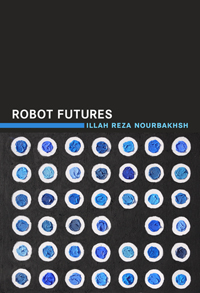March 25, 2013
 PITTSBURGH-Robots already vacuum our floors, help dispose of bombs and are exploring Mars. But in his new book, "Robot Futures," Illah Nourbakhsh, professor of robotics at Carnegie Mellon University, argues that robots are not just wondrous machines, but a new species that bridges the material and digital worlds. The ramifications for society are both good and bad, he says, and people need to start thinking about that.
PITTSBURGH-Robots already vacuum our floors, help dispose of bombs and are exploring Mars. But in his new book, "Robot Futures," Illah Nourbakhsh, professor of robotics at Carnegie Mellon University, argues that robots are not just wondrous machines, but a new species that bridges the material and digital worlds. The ramifications for society are both good and bad, he says, and people need to start thinking about that.
Nourbakhsh will discuss Robot Futures at a book-signing event at 4:30 p.m., April 3 in Rashid Auditorium, on the fourth floor of Carnegie Mellon's Gates and Hillman centers, 4902 Forbes Ave.
In the book, published by MIT Press, Nourbakhsh contemplates what might happen in the not-so-distant future as robots become both ubiquitous and highly capable. Some robots no doubt will display annoying behaviors - what he calls "robot smog." Robots, in turn, will bring out the worst in some people, who will see robots as targets for bullying and other abuse. Robots will serve as physical avatars, enabling people to interact simultaneously with others in farflung locations and circumstances. They may even enable people to assume new and different forms. Robots may well change perceptions of what it means to be human.
Nourbakhsh interweaves fictional scenarios illustrating the possible futures that robots may create with explanations of the real technology that underlies those scenarios. In much the same way as the Internet has sometimes coarsened society and shifted power, robots could reduce accountability of individuals and strengthen the power of corporations and other large institutions, he says. But he also lays out his vision for using robots to empower individuals and communities and counteract many of robots' unwanted side effects.
"My hope is that this book will help us envision, discuss and prepare for change, so that people and communities can influence how the robot future unfolds," Nourbakhsh said.
In a companion blog to the book, www.robotfutures.org, Nourbakhsh tracks and comments on news stories regarding robotics.
Nourbakhsh is director of the Community Robotics, Education and Technology Empowerment (CREATE) Lab and head of the Robotics Masters Program in Carnegie Mellon's Robotics Institute. He formerly led the Robotics Group at NASA's Ames Research Center. A CMU faculty member since 1997, his research includes educational and social robotics and the use of robotic technologies to empower individuals and communities.
The Robotics Institute is part of Carnegie Mellon's School of Computer Science. Follow the school on Twitter @SCSatCMU.
###
Press Release: New Book by Carnegie Mellon Roboticist Suggests Humans Brace Themselves for Robo-Innovation
"Robot Futures" Foresees Society That Will Be Shaped by Ubiquitous Robots
Contact: Byron Spice / 412-268-9068 / bspice@cs.cmu.edu PITTSBURGH-Robots already vacuum our floors, help dispose of bombs and are exploring Mars. But in his new book, "Robot Futures," Illah Nourbakhsh, professor of robotics at Carnegie Mellon University, argues that robots are not just wondrous machines, but a new species that bridges the material and digital worlds. The ramifications for society are both good and bad, he says, and people need to start thinking about that.
PITTSBURGH-Robots already vacuum our floors, help dispose of bombs and are exploring Mars. But in his new book, "Robot Futures," Illah Nourbakhsh, professor of robotics at Carnegie Mellon University, argues that robots are not just wondrous machines, but a new species that bridges the material and digital worlds. The ramifications for society are both good and bad, he says, and people need to start thinking about that.Nourbakhsh will discuss Robot Futures at a book-signing event at 4:30 p.m., April 3 in Rashid Auditorium, on the fourth floor of Carnegie Mellon's Gates and Hillman centers, 4902 Forbes Ave.
In the book, published by MIT Press, Nourbakhsh contemplates what might happen in the not-so-distant future as robots become both ubiquitous and highly capable. Some robots no doubt will display annoying behaviors - what he calls "robot smog." Robots, in turn, will bring out the worst in some people, who will see robots as targets for bullying and other abuse. Robots will serve as physical avatars, enabling people to interact simultaneously with others in farflung locations and circumstances. They may even enable people to assume new and different forms. Robots may well change perceptions of what it means to be human.
Nourbakhsh interweaves fictional scenarios illustrating the possible futures that robots may create with explanations of the real technology that underlies those scenarios. In much the same way as the Internet has sometimes coarsened society and shifted power, robots could reduce accountability of individuals and strengthen the power of corporations and other large institutions, he says. But he also lays out his vision for using robots to empower individuals and communities and counteract many of robots' unwanted side effects.
"My hope is that this book will help us envision, discuss and prepare for change, so that people and communities can influence how the robot future unfolds," Nourbakhsh said.
In a companion blog to the book, www.robotfutures.org, Nourbakhsh tracks and comments on news stories regarding robotics.
Nourbakhsh is director of the Community Robotics, Education and Technology Empowerment (CREATE) Lab and head of the Robotics Masters Program in Carnegie Mellon's Robotics Institute. He formerly led the Robotics Group at NASA's Ames Research Center. A CMU faculty member since 1997, his research includes educational and social robotics and the use of robotic technologies to empower individuals and communities.
The Robotics Institute is part of Carnegie Mellon's School of Computer Science. Follow the school on Twitter @SCSatCMU.
###